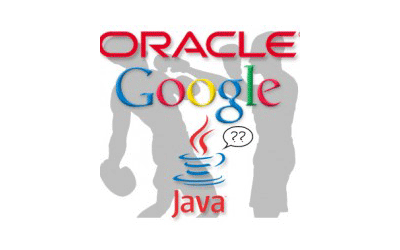Oracle’s copyright case against Google has dragged on for nine years. The case has generated multiple federal district court trials and appellate decisions. Hundreds of thousands of words have been written on the case. Academic careers have been built on it (OK, I’m exaggerating, but not by much).
Now that the case is before the Supreme Court a new, even larger audience wants to understand it. However, few people want to struggle through the lengthy court decisions or law review articles.
Here is my summary of the issues in the case in a nutshell. Almost all jargon and many details omitted.
****************
First Issue – copyrightability. Oracle owns the Java  programming language. Part of Java is an application programming interface (“the Java API”). These are pre-written programs that allow programmers to perform common programming tasks. When Google built its Android smartphone operating system it copied verbatim a significant portion (over 11,000 lines) of the Java API.
programming language. Part of Java is an application programming interface (“the Java API”). These are pre-written programs that allow programmers to perform common programming tasks. When Google built its Android smartphone operating system it copied verbatim a significant portion (over 11,000 lines) of the Java API.
The Java API uses commands and syntax that look a lot like computer code. Here’s an example:
The Copyright Act protects computer programs. It defines a computer program as “a set of statements or instructions to be used directly or indirectly in a computer in order to bring about a certain result.” Oracle argues that both the text and the structure, sequence and organization of the API fall squarely within this definition.
However, the Copyright Act excludes from copyright protection “methods of operation,” a term that is undefined. Google argues that the Java API is a method of operation, and therefore not copyright-protected.
The Federal Circuit held that the text and the structure, sequence and organization of the Java API are protected by copyright. Google is asking the Supreme Court to reverse that holding.
Second issue – fair use. Even if the Java API is copyright-protected Google has a second defense – that it’s use of the Java API is fair use. A jury decided this issue in Google’s favor. Oracle appealed, and the Federal Circuit reversed, holding that Google’s use of the Java API is not protected by fair use. Google is asking the Supreme Court to reverse that holding.
What happens next. If the Supreme Court holds that the Java API is not copyright-protected, Google wins and the case ends. If it holds that Google’s use of the Java API is fair use Google wins and the case ends.
If the Court rules in favor of Oracle on both issues (upholding the two Federal Circuit decisions) the case will be remanded for a trial in the district court to determine Oracle’s damages. Oracle is expected to ask a jury to award it $9 billion.
That’s it, in a nutshell.
If you want to explore the case in more detail go to my Oracle v. Google Resources Page.

